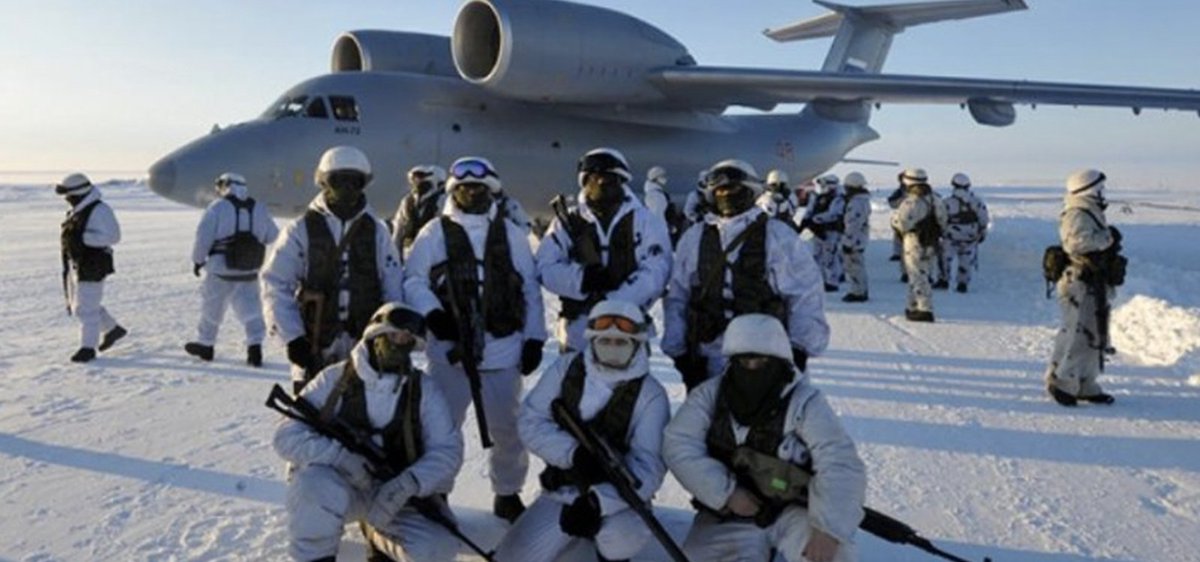1/ A Russian Arctic brigade which has been recruiting from prison colonies is reported to have been decimated in Ukrainian attacks on Russian-occupied islands in the Dnipro estuary and Black Sea, suffering as much as 80% casualties. ⬇️ 

2/ The 80th Arctic Motorised Rifle Brigade was created in 2014 to protect Russian territories bordering Norway and Finland, along a line from Murmansk to the New Siberian Islands. Although it is a specialist Arctic warfare unit, much of the brigade was sent to Ukraine in 2022.
3/ Since then, according to relatives, many of its soldiers have been killed or wounded while stationed on islands in the Kherson region. The brigade began recruiting convicts in 2023, apparently after losing scores of men in Ukraine.
4/ The Dnipro downstream of Kherson flows around dozens of islands, most notably the strategically located Great Potʹomkinsʹkyy Island just south of Kherson city. More Russian-held islands are located in the Black Sea along the Gulf of Tendra and the Dzharylhats’ka Gulf. 

5/ The contested islands include Great Potʹomkinsʹkyy (marked as 1 on this map), the Tendra Spit (2), Orlov (3), Dzharylhach (4) and the Kalanchak Islands (5). Many are nature reserves but have reportedly been heavily damaged by the Russian occupation. 

6/ The Ukrainians claimed in January 2023 to have recaptured Great Potʹomkinsʹkyy Island. In August 2023, many Russian casualties were reported from a HIMARS strike on Dzharylhach.
https://x.com/visegrad24/status/1686862946226348033
7/ According to Irina Ivanovna, the mother of one soldier from the brigade who is currently listed as missing, "the drones are buzzing all the time. You can't get there by boat, the fighting is still going on."
8/ "I called the military unit and was told that 80 per cent of the brigade had been killed or wounded. A boy who served with my son was wounded in the stomach. He says my son stayed there and [the other man] was hospitalised. How come everyone was walking past [my son]?"
9/ "Don't we not abandon our own? On 29 April I was given a document that he was missing. They say that when Kherson is liberated, then they will search these islands."
10/ Irina says she was happy when her son volunteered – "I told him: 'I knew you weren't a coward'" – but she is worried that she does not know whether he is now alive or dead. However, as she told Sever.Realii, she approves of the 'Special Military Operation'. 

11/ - "We need to finish with these Banderites, they all need to be destroyed so that they don’t raise their dragon heads again."
- "Even at the cost of your son's life?"
- "What, would it be better if they came here? Were there not enough of them sitting here?"
- "Even at the cost of your son's life?"
- "What, would it be better if they came here? Were there not enough of them sitting here?"
12/ "They ran around the city, married our Russian girls. Did whatever they wanted. Then they went to their Ukraine. We had Banderovites in Pechora, we had a zone here."
(She admits that she has never met a Bandera supporter.)
(She admits that she has never met a Bandera supporter.)
13/ Irina's own family was severely repressed under Stalin; her grandfather was shot and her grandmother was sent to Siberia. Nonetheless, she says the Soviet government was probably justified in doing so.
14/ "God knows what was going on in 1937, there were probably gangs. The Soviet government wouldn't just send a family to the middle of nowhere. They wouldn't just shoot them!"
15/ Sergei Romantsov from Severodvinsk was serving a prison sentence for drug offences when he signed a military contract. He did so against the advice of his family, who told him that he would be safer serving out the remaining two years of his sentence. 

16/ He was sent to the Kherson islands in April 2024 but disappeared, likely killed, within weeks. His sister Nina says: "He was appointed a motorman [boat pilot]. They get into boats at night, go on missions, pick up the wounded."
17/ At the end of April, he called and said that he had undergone a baptism of fire. And a week later, he disappeared."
"He called me and said he was leaving for a mission at night. The last call was on 1 May at 23:55, after that there was no contact.
"He called me and said he was leaving for a mission at night. The last call was on 1 May at 23:55, after that there was no contact.
18/ Usually, when he returned from a mission, he would get in touch. At 3 am, at 5 am. On 1 May, he was still alive, what happened next is unknown. I found out that his boat was hit: either by a shell or a drone. There were survivors, many were killed."
19/ She learned from other men in the brigade that "about a month and a half ago they went to the islands to pick up the wounded and dead. There was an opportunity. Now these islands are completely under the control of Ukraine. No one wants to go there – it’s certain death.
20/ The bodies that were left there, will most likely remain there. It’s impossible to get there."
21/ The casualties on the islands were so high that the men did not have time to get to know each other before they were killed. "The last commander lasted a month there. Many guys served only a week. As far as I understand, they were simply sent to be butchered." /end
Source:
severreal.org/a/proigraem-my…
severreal.org/a/proigraem-my…
• • •
Missing some Tweet in this thread? You can try to
force a refresh











